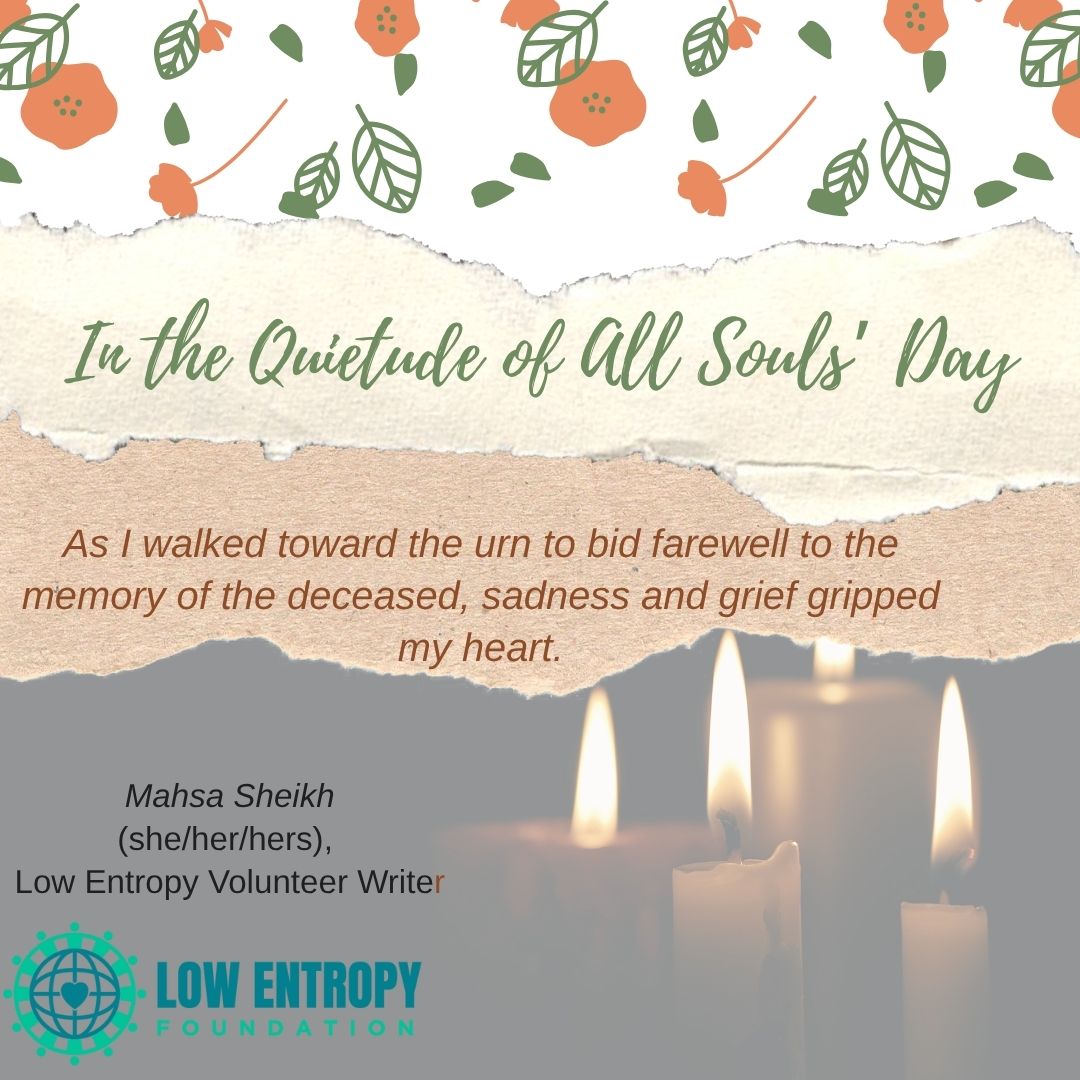Mahsa Sheikh, Low Entropy Volunteer Writer
November is the darkest month, laying trees bare and leafless, bringing back gloomy days of massive clouds impregnated with rain or occasional hail and nightfalls of cold spells and heavy thunderstorms. Poppies, pinned on coat lapels, bleed memories in silence and quietude; bulky sweaters—out of the storage bin, aired and ready—find their way into closets; the smell of fresh gourmet coffee and baked apple pie brings back memories of cozy moments near the fireplace. As soon as mid-November hits, people finalize holiday planning and start shopping for Christmas decorations and holiday baking. In certain traditions and cultures around the world, November stands for more than simply the cold and a deep dive into tiny rituals that keep the spirit of the season alive.
It was a fine sunny day in mid September and we were about to enter Hatley Memorial Garden on Colwood to attend the burial of the ashes of a close-knit tie. I was in the black zip-up blazer and wide-legged pants I had purchased on the occasion of starting a teaching gig last summer. I had, prior to that moment, no real idea about dressing for occasion; putting it on to attend a funeral had never occurred to me. I had also fastened my hair into a sleek, plain bun with the help of a black elastic band recovered from Tibault’s treasure trove of a few other lost tokens around the house. I had to use the scissors to remove the tag on my new shades before putting them on to leave the house.
The immediate memory of my father bringing us back souvenirs from his visits to Germany and India, Isfahan and Shiraz, Tabriz and Kermanshah stirred in me emotions of longing and loss as we stopped in front of the burial site. The relatives of the deceased had arrived a few minutes before us. We were welcomed and greeted, and stood there waiting for the celebrant to start. When he entered the site, we all left off casual conversation and walked over to the open grave. The urn containing the deceased’s ashes rested on a wooden recess above the open grave. The widow of the deceased opened a small bag full of cut-out pink paper hearts and laid it next to the urn. Cheerful music was picked to be played throughout the ceremony. The celebrant asked if anyone had prepared anything to read before placing the urn into its eternal resting place. We lined up as we took turns to put paper hearts in the dark green cloth bag the urn was placed in. The cloth bag would later be tied up to help place the urn into the grave with care.
I was the last person to place the tiny paper cutout in the cloth bag. As I walked toward the urn to bid farewell to the memory of the deceased, sadness and grief gripped my heart. I tried my best to hold it together, but as soon as I stepped back to stand in a corner under the one and only oak tree on the site, I broke into tears. Overwhelmed by the idea of mortality and our time on the Earth, my memory took me back to the day the news of my father’s death was given to me over the phone at a time when I was living miles and miles away. For a long time I wasn’t able to feel anything about it. I knew it had something to do with his long-term illness and how things were back when I was growing up. Fathoming a father-daughter relationship that was interrupted was something that I was neither prepared for, nor had the courage to face.
Our father passed away on November 2, after a prolonged period of illness. His death coincides with All Souls’ Day. The day, as observed in the Roman Catholic faith, commemorates the faithful departed. I felt the need to convert the day from the Persian calendar to the Christian calendar because with time I learned that aligning my values from the culture I was raised in with the one I live in helps translate thoughts and related emotions much more easily than withholding my feelings of separation and loss and the immediate need to belong.
Memories last if embraced: a sweet memory is one that is cherished and kept close to heart, burgeoning hopes and desires in the bearer; a bitter memory is usually believed to leave its bearer with life lessons to adhere to—with caution and an increased sense of accountability. And apart from their inherent goodness and significance in recasting one’s character, sweet bitter memories are almost always ones to commemorate for having their bearer detach from the objects of their desire, believing that they will no longer serve them any good. Irish poet Nikita Gill paints a more subtle image of the idea of leaving behind our past selves for the self we are becoming, writing: “The ghosts of women you used to be are so proud of who you have become.” That is what real women do to save their hearts from the fate of Ophelia.
—
Leave your thoughts for Mahsa in the comments below. You can also follow us on Facebook, Instagram, TikTok, LinkedIn and YouTube to stay up-to-date with Low Entropy news!

